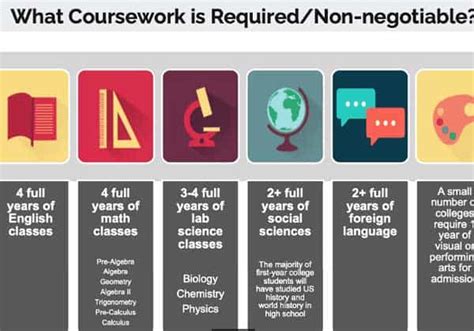For high school students, college can seem like a distant dream. However, a solid academic foundation ensures a smooth transition to college and helps you make the most of your higher education experience. But what classes do you need to get into college? This comprehensive guide will break down the essential classes you need to take in high school to prepare for college and beyond.

Core Academic Classes
English
English courses develop essential communication skills in reading, writing, listening, and speaking. They prepare students to effectively express ideas, analyze literature, and engage in critical thinking.
Mathematics
Mathematics courses provide a foundation in numerical literacy, problem-solving, and logical reasoning. Algebra, geometry, and calculus are essential for success in college-level math courses and various STEM fields.
Science
Science courses expose students to the natural world, fostering an understanding of scientific principles and methods. Biology, chemistry, and physics are core science classes that prepare students for college-level science and healthcare careers.
Social Studies
Social studies courses explore human history, geography, economics, and government. They develop students’ critical thinking, analytical skills, and understanding of societal issues.
Foreign Language
Foreign language classes provide an opportunity to learn a new language and culture. They enhance communication skills, improve cognitive function, and open up global career opportunities.
Elective Classes
In addition to core academic classes, elective courses allow students to explore their interests and develop specific skills. Some common elective categories include:
Arts
Arts courses, such as music, art, and drama, foster creativity, self-expression, and problem-solving abilities.
Computer Science
Computer science courses provide a foundation in programming, coding, and computer technologies. They prepare students for careers in technology and data analytics.
Career and Technical Education (CTE)
CTE courses offer hands-on training in specific career fields, such as culinary arts, automotive repair, and construction. They prepare students for immediate entry into the workforce after high school.
Common Mistakes to Avoid
Neglecting Core Classes: Students sometimes focus on elective classes and neglect core academic subjects. Prioritize completing all required core classes for college admission.
Not Taking Challenging Courses: Colleges prefer students who challenge themselves with rigorous coursework. Take honors, AP, or IB classes to demonstrate your academic capabilities.
Not Seeking Guidance: Consult with your academic advisor or school counselor for guidance on course selection and college planning. They can provide valuable insights and support.
How to Step-by-Step Approach
1. Get Academic Advice: Reach out to your school counselor or academic advisor for guidance on course selection.
2. Explore College Requirements: Research the admission requirements of colleges you are interested in. Determine the specific classes they require.
3. Plan Your Course Schedule: Create a four-year high school course plan that includes all required and preferred classes.
4. Maintain High Grades: Consistently earn high grades in all your classes to demonstrate your academic excellence.
5. Seek Extracurricular Activities: Participate in extracurricular activities that align with your interests and demonstrate your skills.
Why It Matters
College Admission: Meeting college admission requirements is essential for getting into the college of your choice.
Academic Success: A solid high school education prepares students for the rigors of college coursework.
Career Opportunities: The classes you take in high school can open doors to various career paths.
Benefits
Improved Critical Thinking: Academic classes develop students’ critical thinking, analytical, and problem-solving abilities.
Enhanced Communication Skills: English classes improve students’ communication skills in reading, writing, speaking, and listening.
Strong Academic Foundation: A rigorous high school curriculum provides a firm foundation for college-level studies.
Preparation for Career or Further Education: The classes you take prepare you for immediate entry into the workforce or advanced education.
Conclusion
Choosing the right classes for college is a crucial decision that can impact your future. By understanding the essential core and elective courses, avoiding common mistakes, and following a step-by-step approach, you can create a strong academic foundation for college success. Remember, your high school education is an investment in your future, so make the most of it!
Table 1: Required Core Academic Classes
| Subject | College Requirement |
|---|---|
| English | 4 years |
| Mathematics | Algebra I, Geometry, Algebra II |
| Science | Biology, Chemistry, Physics |
| Social Studies | World History, US History, Government |
| Foreign Language | 2-3 years |
Table 2: Common Elective Class Categories
| Category | Courses |
|---|---|
| Arts | Music, Art, Drama |
| Computer Science | Programming, Coding, Computer Technologies |
| Career and Technical Education | Culinary Arts, Automotive Repair, Construction |
Table 3: College Admission Requirements by Subject
| College | English | Math | Science | Social Studies | Foreign Language |
|---|---|---|---|---|---|
| Harvard University | 4 yrs | Algebra I, Geometry, Algebra II | Biology, Chemistry, Physics | World History, US History | 2-3 yrs |
| Stanford University | 4 yrs | Algebra I, Geometry, Algebra II | Biology, Chemistry, Physics | World History, US History | 2-3 yrs |
| Massachusetts Institute of Technology (MIT) | 4 yrs | Calculus I, Calculus II | Physics I, Physics II, Chemistry | World History, US History | 2-3 yrs |
| University of California, Berkeley | 4 yrs | Algebra I, Geometry, Algebra II, Precalculus | Biology, Chemistry, Physics | World History, US History | 2-3 yrs |
Table 4: Benefits of a Solid High School Education
| Benefit | Explanation |
|---|---|
| Improved Critical Thinking | Develops students’ analytical, problem-solving, and decision-making abilities. |
| Enhanced Communication Skills | Equips students with proficient reading, writing, speaking, and listening skills. |
| Strong Academic Foundation | Provides a firm basis for college-level coursework and academic success. |
| Preparation for Career or Further Education | Prepares students for entry into the workforce or advanced educational programs. |
